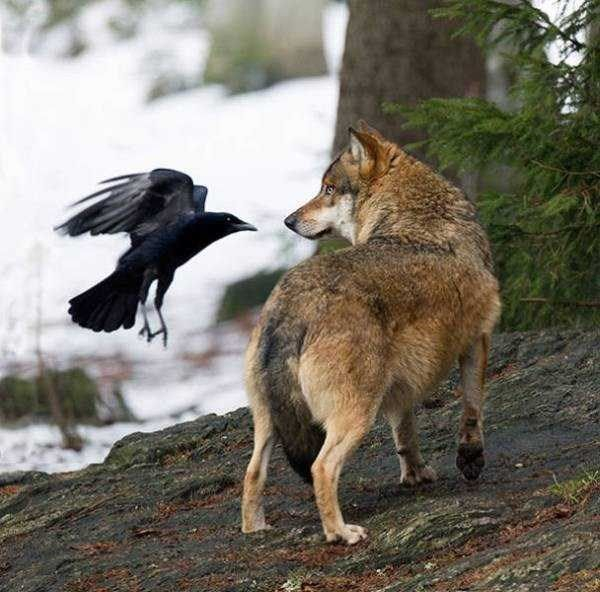When you think of dynamic duos in the animal kingdom, your mind might wander to the obvious like symbiotic relationships between bees and flowers or clownfish and anemones. But have you ever considered the extraordinary partnership between wolves and ravens? These two wild species form a unique companionship that is as intriguing as it is mutually beneficial.
The Mutual Benefits of Wolves and Ravens
1. Food Sharing:
Wolves, being apex predators, often leave behind remnants of their kills. This is where ravens, the opportunistic scavengers, swoop in. The wolves' leftovers provide a significant food source for ravens, ensuring they have a steady supply of sustenance. Conversely, ravens assist wolves by leading them to potential prey. This mutualistic relationship means that both species benefit from each other's hunting prowess.
2. Hunting Assistance:
Ravens have been known to follow wolf packs, often guiding them to prey. These intelligent birds use their keen eyesight and aerial advantage to spot potential meals from afar. Their behavior and calls can alert wolves to the presence of prey or dangers in the vicinity. In return, the ravens get first dibs on the spoils once the wolves make a kill.
3. Communication and Cooperation:
The communication between ravens and wolves is remarkable. Ravens' calls and behaviors serve as signals to wolves, who are adept at interpreting these cues. This interspecies communication enhances the wolves' ability to hunt and stay safe. For example, ravens' calls can indicate nearby threats or lead wolves to carcasses left by other predators or natural deaths.
Fun Facts About Their Companionship
Playful Interactions
Young wolves often engage in playful interactions with ravens. These playful encounters, which can include chasing and mock-fighting, help strengthen the bond between the species. It's not just about survival; it's also about social interaction and learning.
Intelligent Scavengers
Ravens are among the most intelligent birds, known for their problem-solving skills and ability to use tools. This intelligence makes them excellent companions for wolves, who also possess high levels of social intelligence and cooperative hunting strategies. Together, they form a formidable team in the wild.
Ecological Clean-Up Crew
Ravens' efficiency in scavenging helps maintain the health of the ecosystem by ensuring that carrion is quickly removed. This reduces the attraction of other scavengers or predators that might compete with or threaten the wolf pack. It's nature's way of keeping the environment clean and balanced.
Aerial Surveillance
With their ability to fly, ravens provide an aerial perspective that wolves can't achieve. This vantage point allows ravens to spot prey or dangers from great distances, effectively acting as aerial scouts for the wolves. This unique perspective is invaluable in the vast, often challenging terrains where wolves roam.
The Broader Ecological Impact
The relationship between ravens and wolves goes beyond their mutual benefits. It highlights the interconnectedness of different species within an ecosystem and how their interactions can shape the environment. By helping each other find food and stay safe, wolves and ravens contribute to the overall health and balance of their habitat.
The Evolution of a Unique Partnership
This fascinating companionship likely evolved over millennia, with both species learning to recognize and capitalize on the benefits of their interactions. It's a testament to the adaptability and intelligence of wolves and ravens, showcasing nature's incredible ability to foster symbiotic relationships.
The partnership between wolves and ravens is a remarkable example of interspecies cooperation. Their mutual benefits, from food sharing to communication and hunting assistance, highlight the intricate and intelligent ways different species interact in the wild. This dynamic duo enhances each other's survival and contributes to their environment's ecological balance.
